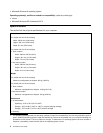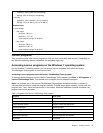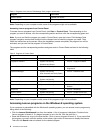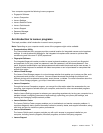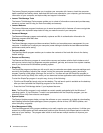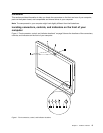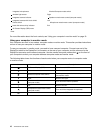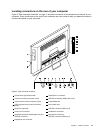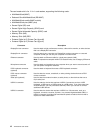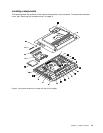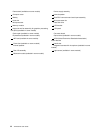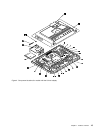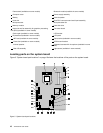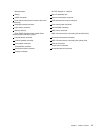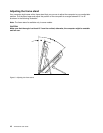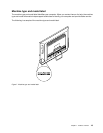
The card reader slot is for 11-in-1 card readers, supporting the following cards:
• MultiMediaCard (MMC)
• Reduced-Size MultiMediaCard (RS-MMC)
• MultiMediaCard-mobile (MMC-mobile)
• MultiMediaCard-plus (MMC-plus)
• Secure Digital (SD) card
• Secure Digital High-Capacity (SDHC) card
• Secure Digital eXtended-Capacity (SDXC) card
• Memory Stick (MS)
• Memory Stick (MS) PRO
• Extreme Digital (x-D) Picture Card (type M)
• Extreme Digital (x-D) Picture Card (type H)
Connector Description
DisplayPort-out connector
Used to attach a high-performance monitor, a direct-drive monitor, or other devices
that use a DisplayPort connector.
DisplayPort-in connector Used to attach your computer to a DisplayPort monitor connector on a second
computer so that you can use your computer in monitor mode.
Ethernet connector
Used to attach an Ethernet cable for a local area network (LAN).
Note: To operate the computer within FCC Class B limits, use a Category 5 Ethernet
cable.
Microphone connector
Used to attach a microphone to your computer when you want to record sound or if
you use speech-recognition software.
PS/2 keyboard connector
(optional)
Used to attach a keyboard that uses a PS/2 keyboard connector.
PS/2 mouse connector
(optional)
Used to attach a mouse, a trackball, or other pointing devices that use a PS/2
mouse connector.
Serial port (optional)
Used to attach an external modem, a serial printer, or other devices that use a
9-pin serial port.
USB 2.0 connector Used to attach a device that requires a USB 2.0 connector, such as a USB
keyboard, a USB mouse, a USB scanner, or a USB printer. If you have more than
six USB devices, you can purchase a USB hub, which you can use to connect
additional USB devices.
USB 3.0 connector Used to attach a device that requires a USB 2.0 or 3.0 connector, such as a
keyboard, a mouse, a scanner, a printer, or a personal digital assistant (PDA). A
USB 3.0 connector provides high transmission speeds to reduce the time that is
required for data transmission.
12 ThinkCentre User Guide



